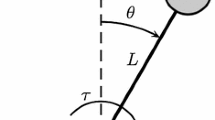Abstract
Dynamic system is important for cognitive science in which cognitive map, fuzzy cognitive map are special cases. Both cognitive and fuzzy cognitive maps have complex state spaces, that is: chaos, limit cycles, fixed points and so on. In this paper, we study a class of fuzzy dynamic system, which called linguistic dynamic system. As a result, class of linguistic dynamic system is always convergent.



Similar content being viewed by others
References
Haykin S (2012) Cognitive dynamic systems. Cambridge University Press, Cambridge
Kosko B (1991) Neural network and fuzzy systems: A dynamical systems approach to machine intelligence. Prencice Hall, Har/Dskt Edition
Axelrod R (1976) Structure of Decision: The Cognitive Maps of Political Elites. Princeton Legacy Library
Kosko B (2018) Fuzzy cognitive mpas. Int J Man Mach Stud 24:65–75
Glykas M (2010) Fuzzy cognitive maps, advances in theory, tools and applications. Springer, Berlin
Papageorgiou EI (2014) Fuzzy cognitive maps for applied science and engineering from fundamentals to extensions and learning algorithms. Springer-Verlag, Berlin
Ho NC, Lan VN, Viet LX (2006) An interpolative reasoning method based on hedge algebras and its application to problem of fuzzy control. In: Proc. of the 10th WSEAS International on Computers, Vouliagmeni, Athens, Greece, July 13-15, pp 526–534
Timothy JR (2010) Fuzzy logic with engineering applications, Third Edition. John Wiley & Sons, New York
Lotfi AZ (1971) Toward a theory of fuzzy systems. In: Kalman RE, De Claris N (eds) Aspects of network and system theory, pp 469–490
Ho NC, Wechler W (1990) Hedge algebras: An algebraic approach to structure of sets of linguistic truth values. Fuzzy Sets Syst 35(3):281–293
Ho NC, Son TT, Khang TD, Viet LX (2002) Fuzziness measure, quantified semantic mapping and interpolative method of approximate reasoning in medical expert systems. J Comput Sci Cybern 18 (3):237–252
Nguyen VH, Vinh PC (2018) Toward modeling and reasoning with words based on hedge algebra. EAI Endorsed Trans. Context-aware Syst. & Appl, 5(15)
Nguyen VH, Vinh PC (2018) Modeling with words based on hedge algebra. In: 7th EAI International Conference ICCASA 2018 and 4th EAI International Conference, ICTCC 2018, pp 266
Nguyen VH, Nguyen CH, Vinh PC (2019) Toward aggregating fuzzy graphs: A model theory approach. Context-Aware Systems and Applications, and Nature of Computation and Communication. ICCASA 2019, ICTCC 2019. Lecture Notes of the Institute for Computer Sciences, Social Informatics and Telecommunications Engineering, pp 298
Nguyen VH, Vinh PC (2020) Reasoning with words: A hedge algebra linguistic cognitive map approach, Concurrency and Computation Practice and Experience
Zadeh LA (2012) Computing with words - Principal Concepts and Ideas. Studies in Fuzziness and Soft Computing. Springer, Berlin
Zadeh LA (1972) Fuzzy-set-theoretic interpretation of linguistic hedges. Journal of Cybernetics, 2
Zadeh LA (1975) The concept of a linguistic variable and its applications to approximate reasoning. Inf Sci 8(3):199–249
Ho NC, Nguyen VL (2007) Fuzziness measure on complete hedge algebras and quantifying semantics of terms in linear hedge algebras. Fuzzy Sets Syst 158(4):452–471
Nguyen VH, Nguyen CH (2021) Algorithm for reasoning with words based on linguistic fuzzy cognitive map. Concurrency and Computation Practice and Experience. https://doi.org/10.1002/cpe.6415
Author information
Authors and Affiliations
Corresponding author
Additional information
Publisher’s Note
Springer Nature remains neutral with regard to jurisdictional claims in published maps and institutional affiliations.
Rights and permissions
About this article
Cite this article
Van Han, N., Vinh, P.C. Toward Modeling Fuzzy Dynamic System Based on Linguistic Values. Mobile Netw Appl 26, 1339–1343 (2021). https://doi.org/10.1007/s11036-021-01765-x
Accepted:
Published:
Issue Date:
DOI: https://doi.org/10.1007/s11036-021-01765-x




